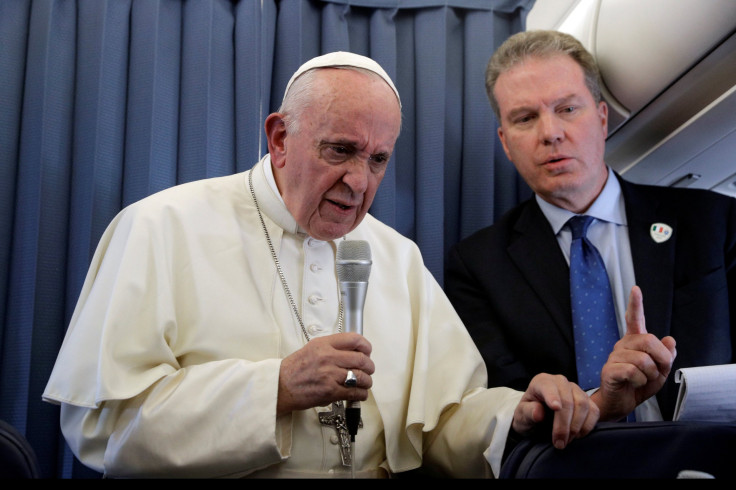Pope Francis Says Homosexual Children Should Not Be Condemned, Ignored By Parents

Pope Francis, during an in-flight press conference while on his way from Dublin to Rome on Sunday, said parents should not condemn their children for their sexual orientation, and should rather pray, talk and try to understand them.
He was speaking to reporters after closing out a Catholic family rally in Ireland. He said that parents should not ignore their children or throw them out of their homes for their sexual orientation. The Pope was replying to a question posed by a reporter, who asked him what he would say to a father whose son comes out as homosexual and wants to live with his significant other.
“I would say first to pray, pray! Don’t condemn. Dialogue, understand, make space for son and the daughter. Make space so they can express themselves,” the Pope said, replying to the question.
He didn’t want parents to ignore how their children were and wanted to promote dialogue between children and their parents, so the latter could have a better understanding of the situation. The Pope said homosexuality and people with homosexual tendencies had always existed.
“There have always been homosexuals, people with homosexual tendencies,” the Pope said. “I don’t know if it’s true, that in times of epochal changes, some social, ethical phenomena increase; one of them would be this. This is an opinion of some sociologists.”
The Pope said that at times, it might be necessary to seek psychiatric help when a child displays “worrisome” traits.
“One thing is when it shows itself in a child. There are many things to do with psychiatry, to see how things are. Another thing is when it manifests itself after 20 years of age,” he said.
One thing that the Pope stressed on was that parents should never respond to such situations — where their children exhibit or openly come out as homosexuals — with silence. He said silence was never the remedy.
“To ignore a son or daughter with homosexual tendencies is a lack of paternity and maternity. You are my son, you are my daughter as you are! I’m your father, mother. Let’s talk!” he said.
He advised parents that if they themselves weren’t up to talking with their children over such issues, they shouldn’t shy away from asking for help, but again stressed the children have rights to a family and of not being chased out of that family.
I ask our Blessed Mother to intercede for the healing of the survivors of abuse and to confirm every member of our Christian family in the resolve never again to permit these situations to occur.
— Pope Francis (@Pontifex) August 26, 2018
In his address, he also said he would not speak a word about accusations made against him by Archbishop Carlo Maria Viganò, adding the reports and documents would speak for themselves. The Archbishop asked for the Pope’s resignation for rehabilitating the former archbishop of Washington, Theodore McCarrick, even after he was made aware of sexual misconduct claims against the latter.
“Read the statement carefully and make your own judgment. I will not say a single word about this. I believe the statement speaks for itself,” the Pope said.
As the Pope arrives in Dublin #LGBT people have sent a powerful message by decorating one of the city’s most famous landmarks, the Ha’penny Bridge, in rainbow flags. 🏳️🌈🇮🇪
— Scott Cuthbertson (@ScotCuthbertson) August 25, 2018
A powerful sign of how much Ireland has changed in just a few years. #PopeInIreland #hapennybridge pic.twitter.com/4mHxtjsb9r
The last time the head of the Catholic church visited Ireland was in 1979, when John Paul II was the pope. Since then, Ireland has changed drastically changed. From one of the most staunchly Catholic countries on Earth, it has since legalized gay marriages and liberalized the earlier strict prohibition on abortion. The country now has its first openly gay leader as prime minister.
A day before the Pope’s arrival, Prime Minister Leo Varadkar said the church “had too much of a dominant place in our society” previously.
© Copyright IBTimes 2025. All rights reserved.





















